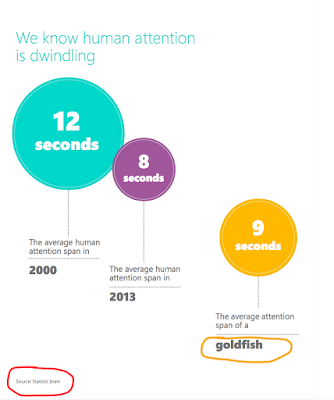Back on January 21, 2017 I blogged about Is the attention span of a marketer shorter than that of a fruit fly? Recently I decided to take another look to see if people were still spouting some nonsense statistics about human attention spans. Unfortunately they were.
Not reading a report carefully
At Jim Donovan Health Solutions on July 29, 2020 there was an article titled What goldfish do better than humans. He linked to a 2015 Microsoft report which you also can find here, and then discusses the research in it. As shown above, on page 6 it has a graphic with three statistics on attention span which DID NOT actually come from there.
Instead they came from a web page cooked up by some jerks at the so-called Statistic Brain Research Institute. There are three versions of that Statistic Brain web page, as shown above (currently hidden behind a paywall) which I instead retrieved from the Wayback Machine. The earliest lists The Associated Press as a source, implying it was in a newspaper article sometime somewhere. The next version adds the authoritative-sounding National Center for Biotechnology Information, U. S. National Library of Medicine. A third updates from 8 to 8.25 seconds.
Did those statistics come from any of their indicated
sources? No! Two skeptical researchers checked and both came up empty. Jo Craven McGinty had an article at the Wall
Street Journal on February 17, 2017 titled Is your attention span shorter than
a goldfish’s? Simon Maybin at BBC News on March 10, 2017 had another article
titled Busting the attention span myth. You can find them both here.
By the way, if you look carefully at the Statistic Brain web pages they just refer to a gold fish. That Microsoft report changed it to one word. As two words it could just refer to the color for a fish (not the species) as shown above based on the 1960 Dr. Seuss children’s book title One fish, two fish, red fish, blue fish.
I read it in a TIME magazine article, so it should be true
Some recent articles are lazy and don’t even go back to that Microsoft report. Instead they just link to a TIME magazine article on May 14, 2015 by Kevin McSpadden titled You now have a shorter attention span than a goldfish. One example is an article by John Stevens at Bitcha on July 29, 2020 titled 7 Research-proven tips for boosting credibility on your website. Another example is an article by Melody Wilding at Forbes on July 27, 2020 titled How to be a confident concise communicator (even when you have to speak off the cuff).
I read it in a TOASTMASTER magazine article, so it must be
true
Even sillier is an article by Peggy Beach on pages 22 to 25 in the July 2020 issue of Toastmaster magazine titled Are You Listening? She says vaguely that:
“….Our society is so fast-paced that according to a
Microsoft study, the average attention span of people has declined from 12
seconds to 8 seconds since the year 2000.”
Why is that silly? A typical speech at a Toastmasters club
is 5 to 7 minutes long. The five minute minimum is twenty-five times the quoted
12 second attention span. If people really just had a 12 second span, then they
would fall asleep long before a speech was done. There could not be any
Toastmasters clubs, but there are more than 16,800 of them!
Our attention span really is about twenty minutes. Many people enjoy watching 18-minute long TED Talks as YouTube videos.
I read it in a book title, so it really must be true
There is a 2017 book by Paul Hellman titled You’ve Got 8
Seconds: communication secrets for a distracted world. Presumably Paul was
distracted when he came up with a title based on a bogus statistic. The Notes
for his Introduction just refer to the Microsoft report and the TIME article.
Based on this, you now should do that
Heck no! We are free to ignore advice based on those bogus statistics. An article by Dr. Heather McKee at ThriveGlobal on July 9, 2020 is titled The impact our phones have on our attention and health and what to do about it. Another article there by Joyce Shulman on July 20, 2020 is titled How to be better than a goldfish tells us seven things to do to retrain our brains.
Images of a stopwatch, a toaster and a trout came from
Wikimedia Commons. The phony TIME cover came from NBC News.









No comments:
Post a Comment